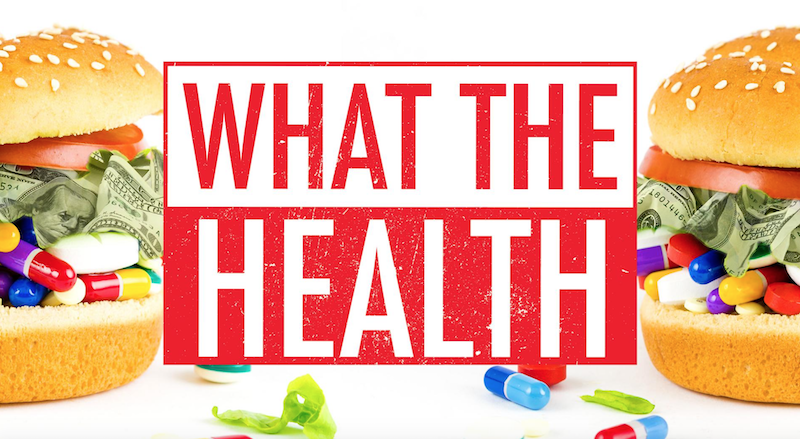I’ve received dozens of emails asking me to review What the Health, a follow-up food documentary from the creators of Cowspiracy, which is currently available on Netflix. I honestly didn’t want to watch it. From the teaser trailers and social media discussions alone, I could have predicted what it would be about.
Nevertheless, after multiple weeks of foot-dragging, I went ahead and charged up my iPad and carved out some 90 minutes for an active viewing session on my elliptical trainer.
After having watched the film, I can see why so many people are getting drawn in. What the Health takes viewers on an existential journey of emotions ranging from anger, panic, shame, anxiety, and guilt.
Filmmaker Kip Anderson vividly brings to life some real social and ethical problems and issues facing America, one of the most obvious being the food industry’s utter influence on nutrition-related research and federal dietary guidelines.
As a ‘rogue’ scientist and health expert, I regularly blog about this issue.
There undoubtedly exists a great deal of selective funding and publication of research that directly supports the ever-growing fiscal agendas of Big Farm, Big Food, and Big Pharma.
It’s no wonder they continue to thrive and flourish, oftentimes, at the expense of our health.
But, I’d be remiss if I didn’t also point out that the natural food movement launched in the late 1960s and early 1970s still remains and has an economic agenda as well. This is evidenced by the sheer commercialization and profitization of health food stores and organic food retail markets.
Some would argue that this has enabled continued gentrification in America and, therefore, exacerbated cultural and socioeconomic inequalities, but I won’t digress further.
“Whole Foods: Gentrification in edible form.”—John Oliver
The highlighting of poor farming and food handling practices in What the Health is also worth noting. However, I’d argue that bad farming practices aren’t at all exclusive to the handling of farm animals and animal-derived foods, as viewers are led to believe.
After having gone vegan for over two years, I can personally attest to the fact that not all vegan foods are created in a sustainable, environmentally friendly manner. This holds especially true for a lot of the faux meats, grains, pastas and other heavily processed foods many vegans tend to eat—A large number of which are branded, marketed and/or sold by large health food chains.
In actuality the inhumane, unsustainable, and environmentally toxic food production and preparation methods as a whole should really be put at the forefront.
Sadly, What the Health doesn’t present a holistic analysis of these very relevant issues.
Nor does it tackle the actual relationship between diet, nutrition, and disease.
Much to my disappointment, What the Health turned out to be yet another one-sided presentation of vague science and generalities, propaganda, and ‘alternative facts’ solely aimed at creating a case for adopting a vegan diet (and ONLY a vegan diet) for longevity and good health.
Related Article: How Malnutrition Drives Food Cravings and Fuels Obesity
Ignoring the critical impact of overall diet quality, this film essentially deems animal-based foods as lone culprits to America’s health crisis and disease epidemic.
From the mouths of Kip and a cast of vegan physicians and health experts with conflicting interests, we learn that milk is cancer-causing “cow pus”, eggs are edible cigarettes, and all forms of fish and seafood are essentially sponges for mercury and other toxins.
Now, I won’t argue with certain factoids, like the inherent dangers of consuming processed meats like hot dogs, ham, bacon, sausage, and most deli meats. Indeed, there are cocktails of chemicals, preservatives, and other dietary irritants naturally housed in these heavily processed meats, which, in combination, can have severe health effects.
Related Article: Are Processed Meats Really Bad for Your Health?
However, the film’s vague conflation of processed meat consumption and cigarette smoking within the context of chronic disease development was an overreach, particularly in relation to both being labeled as “Group 1” carcinogens (cancer causing agents) as per specific criteria laid out by the World Health Organization (WHO).
A laundry list of carcinogens are classified as “carcinogenic to humans”. This essentially means that studies in humans have shown sufficient evidence to indicate a causal relationship between exposure to the agent and human cancer. That’s it! This classification does NOT represent a numerical rating of carcinogenic severity, as the film repeatedly suggests.
A simple review of the “Q&A on the carcinogenicity of the consumption of red meat and processed meat” published on the WHO website would have easily clarified this misinterpretation.
At the end of the day, there are many other factors that’ll influence whether or not processed meat negatively impacts your health. These include your daily eating practices and diet quality, physical activity patterns and, obviously, smoking status.
And, when it comes to meat consumption in general, the real problem starts and ends with traditional Western practices, specifically in terms of preparation methods, portion sizes and food pairings, none of which were points of discussion in What the Health.
For instance, barbecuing, frying or broiling meat is an issue, as these cooking methods typically necessitate the use of very high heats.
A lot of folks don’t realize that cooking meat at high temperatures can lead to the formation of carcinogenic chemicals. The presence of these chemicals is greatest when meats are prepared “well-done”, charred/blackened or smoked since the cooking time and, ultimately, the exposure period is considerably more prolonged.
There’s also the issue of how much meat is consumed.
Countless studies have shown that Americans eat way more meat than any other population in the world. For example, the average French person takes in about 12-13 ounces of red meat each week whereas an American consumes in excess of 30-32 ounces a week.
Related Article: Adopting the Mediterranean Diet for a Healthier You
Adding insult to injury, meat is often paired with starches and starchy vegetables like potatoes, rice and grains, as opposed to non-starchy vegetables like leafy greens, asparagus, carrots, beets and peppers, the latter of which aid in balancing out a lot of the potentially negative side effects of meat consumption.
Any robust discussion of diet, nutrition and disease would address such factors.
This is not the case with What the Health.
Viewers will have to navigate through the sea of cherry-picked data and conflated trends that result in one sole solution—Complete abandonment of animal-based foods. This was evidenced by the absurd notion that meat consumption alone causes diabetes, which will be the last of the many ridiculous ideas I’ll highlight here.
Scarier than this notion itself are the sources—Nearly a dozen medical and health experts.
Given the multifaceted nature of diabetes, I simply can’t believe that anyone who calls himself a medical or health “expert” would dare to deduce that this disease is solely a meat-eater’s issue.
I’ve never heard of chicken raising one’s blood sugar level.
An overabundance of reputable research has repeatedly substantiated the link between excessive carbohydrate intake and diabetes. This holds especially true for refined carbohydrates including highly processed foods like flour, pasta, white bread, pastries, chips, candy, cookies, soft drinks, and cereals—Many of which are regularly consumed by “junk food vegans”.
The body processes all these foods as sugar, which is especially problematic because they tend to digest and absorb rapidly causing pronounced rises in blood glucose and insulin levels.
Related Article: How Insulin Impacts Fat Burning and Weight Loss
In addition to carbohydrate consumption in general, there’s the inevitable influence of heredity and genetic vulnerability to insulin resistance. Obesity and physical inactivity also represent strong linkages, neither of which were even mentioned in the film.
Whether diabetes, cardiovascular disease, hypertension, cancer or even inflammation, the development of chronic disease is a culmination of multiple lifestyle-related factors, with just one of many being EXCESS consumption of animal-based foods.
While all vegan diets eliminate animal-based foods, not all of them are healthy in nature.
Truth is, there’s no one-size fits all eating solution for good health and veganism certainly isn’t the be all and end all. Interindividual differences like genetics, body type, bone structure, body fat distribution, and pre-existing disease status, can directly influence the ways in which our body’s respond to the foods we eat.
When couple with vigorous exercise, my stint as a vegan, led to my developing classic signs and symptoms of the female athlete triad (diagnosed nutritional imbalances and amenorrhea).
Needless to say, I eventually reintroduced animal-based foods into my dietary regimen and I’ve never felt better! Although I’m no longer a vegan, my past adoption of this lifestyle truly changed my general dietary approach for the better.
Eating primarily plant-based foods clearly provides more protection from chronic diseases.
For me, plant-based eating is essentially a way of life, as I can effortless consume in excess of 15-20 servings of fresh veggies, fruits, legumes, nuts and seeds on any given day—This is more than what’s consumed by most of the vegans I personally know and many I’ve worked with. But, I also regularly incorporate seafood, poultry, and occasional red meat into my diet for added nutrition.
Related Article: Intermittent Fasting: How I Control My Weight By Eating One Meal a Day
My personal story isn’t at all unique nor are the stories of many others who thrive on ‘all-inclusive’ diets.
Unfortunately, the thinly veiled egocentric undertones of the film’s producers and a whole cast of completely biased medical and health experts revealed all out efforts to wholly ignore valid science and counterarguments and instead shame carnivores, pescatarians, lacto-ovo vegetarians, flexitarians, and basically any group who’s adopted a diet other than a vegan one.
Much like today’s politics and a lot of religions, What the Health pulled on the strings of fear, uncertainty and doubt (FUD) to influence viewers’ perceptions and behaviors—In this case, their perceptions of healthy eating and, ultimately, their food choices.
Like it or not, there are many sides to this story, which you certainly wouldn’t assume given the one-sided nature of this film and its cast of characters.
Leveraging FUD tactics, What the Health simply dismisses anyone who chooses not to adopt a vegan lifestyle. The key takeaway is go vegan or die. To drive the point home, filmmaker Kip even highlights several questionable anecdotes from people miraculous healing from years of chronic disease and pain after just two weeks of plant-based eating.
This type of all or nothing stance generally breeds the latter (nothing). Instead of taking the steps necessary to do better, many will opt for doing nothing at all.
It’s the same reason extreme weight loss diets usually fail.
I’m not saying that veganism itself is extreme. However, inciting FUD to sway others into veganism is in fact extreme. From a consumer public health perspective, this is a dangerous tactic that’ll do way more harm than good, especially in the long-term.






